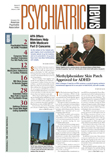Medically appropriate diagnosis and care of workers with depression and anxiety costs employers less over the long term than any money saved by limiting mental health care coverage, according to an article in the November 2005 Journal of Occupational and Environmental Medicine.
“Anxiety and depression cannot be ignored,” wrote Alan Langlieb, M.D., M.P.H., of the Johns Hopkins School of Medicine, and Jeffrey Kahn, M.D., of the Weill Medical College of Cornell University.“ Employees with anxiety and depressive disorders work less hours, are more likely to end up on disability, and are less productive than their counterpart employees.”
Depression affects 10 percent to 25 percent of women and 5 percent to 12 percent of men in the United States over a lifetime, said Langlieb and Kahn, both members of APA's Committee on APA/Business Relations. The comparable rate for anxiety disorders is 29 percent.
Depression costs U.S. citizens and businesses $83.1 billion a year, and anxiety costs $63.1 billion in direct medical expenses and in indirect costs, such as those stemming from suicide, increased comorbid medical illness, and poor medical compliance leading to hospitalization. Indirect costs also include expenses that affect the workplace, such as missed work, lower productivity, and “presenteeism,” when workers show up but can't function at full capacity.
These psychiatric conditions are associated with worse outcomes of physical illnesses and higher medical utilization. Employees with depression and medical conditions like diabetes, hypertension, heart disease, or back ailments incur costs 1.7 times higher than those of similar nondepressed patients.
Despite this, many employers may not acknowledge the presence or extent of these disorders either because they are not immediately visible, psychiatric resources are not available, a belief that treatment won't help, concern with costs, or fear that employees will file disability claims, said Langlieb and Kahn.
Yet failure to diagnose and treat depression and anxiety can paradoxically cost employers more money for general medical services than it saves them, they said.
“If optimal care were more widely available, it is reasonable to expect that there would be substantial benefits to employers and employees,” they wrote.
Sometimes employers' health plans contain provisions for mental health care but managed care intermediaries limit access in practice, said Norman Clemens, M.D., chair of the APA/Busines Relations Committee. “They may limit panels so that fewer psychiatrists are available or increase administrative burdens so greatly that psychiatrists decide not to take part,” he said.
By enlisting major employers in the Partnership for Workplace Mental Health over the last six years, APA has worked to provide better access to care, said Clemens. For example, the business relations committee has worked with the Mid-America Coalition on Health Care in Kansas City to focus on depression in a collaborative rather than an adversarial manner, he said (see
page 3 and Viewpoints article on
page 20).
However, accomplishing that goal more broadly will involve improved access to care and specialized evaluation, said Langlieb and Kahn.
“Mental health benefits that facilitate early intervention are the key,” said Langlieb in a prepared statement. “Employees will have fewer disability claims, greater work productivity, and improved quality of life.” ▪
